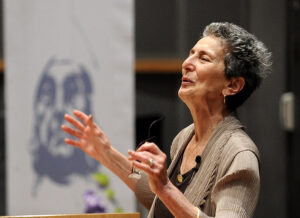
We are deeply saddened to learn that the historian Natalie Zemon Davis has died just shy of her 95th birthday. Her career spanned decades, encompassed early modern France, the Mediterranean, the Atlantic, and the Caribbean, and was never confined to or contented with the scholarly debate du jour but instead incorporated categories of analysis which inspired early modernists and scholars much wider afield. Fiction in the Archives, The Return of Martin Guerre, Trickster Travels, Women on the Margins, The Gift: each of her monographs, let alone her articles, opened up and contended with questions historians have explored since. The creative and urgent topics discussed in the Annual Natalie Zemon Davis Lecture Series, organised in her honour by CEU are a testament to her broad geographical and disciplinary impact. Uniting that sprawling scholarship was NZD’s self-professed status as a ‘Historian of Hope‘, fascinated by the ingenuity of ordinary people‘s resourcefulness and resilience, as well as their responsibility and ambiguity, refusing a simple story of good and evil.
“The best research starts with curiosity“, a curiosity which for NZD incorporated people in the past as well as the present, inspiring in research as well as humanity. She was a deeply engaged citizen – resulting initially in FBI files on her, then in later life named a Companion of the Order of Canada and recipient of the National Humanities Medal – as well as academic citizen – only the second woman to serve as president of the American Historical Association. Amidst those accolades, she remained keen to hear what graduate students and early career scholars were up to, to the extent that the one hot tip to get her to your university while she was on this side of the Atlantic was to tell her you’d organise a tea with graduates. Her curiosity and kindness has inspired a thorough commitment to understanding humans past and present, and will continue to do so through her readers, students, and mentees.
NZD’s generosity reached well beyond the corridors of academia. Her work was always intellectually rigorous as well as accessibly communicated. Her research has been translated into numerous languages as well as formats, shaping a film adaptation as well as a musical of Martin Guerre’s story, and inspiring a stage play. Generations of thinkers, with varying levels of professional commitment to the early modern period, have learnt from NZD to think about the past, present, and future with curiosity, generosity, and imagination. In her own words: “the possibilities of the past invite a commitment to humanity and offer a ray of hope for the future” [A Passion for History, p. 175].
